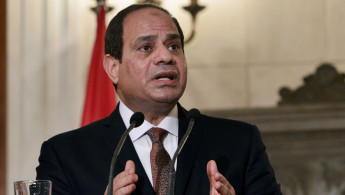Egypt's Sisi to pardon 100 prisoners on revolution anniversary
Egypt's President Abd al-Fattah al-Sisi expected to issue pardons for 100 convicts on the upcoming anniversary of the January 25 revolution, in an attempt to ward of mass anti-government protests.
2 min read
Sisi pardoned 100 prisoners last September [Getty]
Egyptian President Abd al-Fattah al-Sisi is expected to issue pardons for 100 convicts on the upcoming anniversary of the January 25 revolution, in an attempt to ward of mass anti-government protests.
Government sources have said the expected presidential pardon has come following advice from intelligence services that leftist activists could team up with Islamists and pose a "significant threat to the state".
The list will not include Ahmad Maher, the founder of 6 April Movement, and other members of the organisation that played a leading role in the January 25 revolution, according to local media.
An Egyptian official told The New Arab that the General Intelligence Directorate recently summited a report to Sisi, urging for reconciliation with January 25 revolutionaries to prevent them from forming an alliance with the banned Muslim Brotherhood.
"The 2015 pardons that included some imprisoned revolutionaries and left-wing activists did not boost Sisi's popularity among these groups.
"On the contrary, they increased discontent against him because most of the people pardoned were Brotherhood members with short prison sentences remaining," the official said.
The source, who spoke under the condition of anonymity, added that the report advised that prominent jailed activists Alaa Abd al-Fattah and Mahinour al-Masry be released in the pardon to "boost Sisi's popularity and quell calls for protests on the anniversary".
In September 2015, Sisi pardoned 100 prisoners including three al Jazeera television journalists, a day before he head to the annual UN summit of world leaders.
The al Jazeera journalists, Canadian Mohamed Fahmy, Egyptian Baher Mohamed and Australian Peter Greste, were sentenced to three years in prison for operating without a press licence and broadcasting material harmful to Egypt.
Since former Islamist president Mohammad Morsi was overthrown by the military in 2013, authorities have launched a brutal crackdown against his supporters and leftist dissidents, leaving hundreds dead and thousands jailed after often speedy mass trials.
Morsi himself is facing several trials and has already been sentenced to death in one case.
The Muslim Brotherhood has been outlawed as a "terrorist organisation".
Government sources have said the expected presidential pardon has come following advice from intelligence services that leftist activists could team up with Islamists and pose a "significant threat to the state".
The list will not include Ahmad Maher, the founder of 6 April Movement, and other members of the organisation that played a leading role in the January 25 revolution, according to local media.
An Egyptian official told The New Arab that the General Intelligence Directorate recently summited a report to Sisi, urging for reconciliation with January 25 revolutionaries to prevent them from forming an alliance with the banned Muslim Brotherhood.
"The 2015 pardons that included some imprisoned revolutionaries and left-wing activists did not boost Sisi's popularity among these groups.
"On the contrary, they increased discontent against him because most of the people pardoned were Brotherhood members with short prison sentences remaining," the official said.
The source, who spoke under the condition of anonymity, added that the report advised that prominent jailed activists Alaa Abd al-Fattah and Mahinour al-Masry be released in the pardon to "boost Sisi's popularity and quell calls for protests on the anniversary".
In September 2015, Sisi pardoned 100 prisoners including three al Jazeera television journalists, a day before he head to the annual UN summit of world leaders.
The al Jazeera journalists, Canadian Mohamed Fahmy, Egyptian Baher Mohamed and Australian Peter Greste, were sentenced to three years in prison for operating without a press licence and broadcasting material harmful to Egypt.
Since former Islamist president Mohammad Morsi was overthrown by the military in 2013, authorities have launched a brutal crackdown against his supporters and leftist dissidents, leaving hundreds dead and thousands jailed after often speedy mass trials.
Morsi himself is facing several trials and has already been sentenced to death in one case.
The Muslim Brotherhood has been outlawed as a "terrorist organisation".





 Follow the Middle East's top stories in English at The New Arab on Google News
Follow the Middle East's top stories in English at The New Arab on Google News
![Israeli forces ordered bombed Gaza's Jabalia, ordering residents to leave [Getty]](/sites/default/files/styles/image_330x185/public/2176418030.jpeg?h=a5f2f23a&itok=_YGZaP1z)

